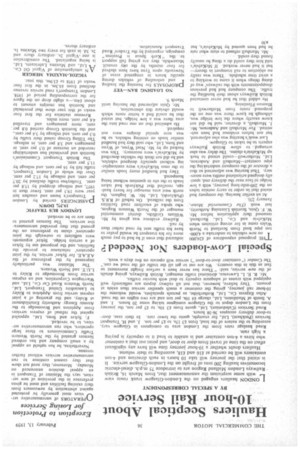Special Low-loaders Not Needed ?
Page 38

If you've noticed an error in this article please click here to report it so we can fix it.
THE proposed expenditure of £24,000
on new vehicles to undertake a 4,000ton pipe haul from Scotland to North Wales came in for strong criticism when McKelvie and Co., Ltd., Barrhead. resumed their application before Mr. W. F. Quin, Scottish Licensing Authority, last week (The Commercial Motor, January 23).
At ati earlier hearing, the company had stated that in order to carry outsize tubes on the 280-mile-long journey, with a low bridge to face near the delivery end. specially designed articulated outfits were necessary. That hearing was adjourned so that a director of the company undertaking the pipe contract—Marshall and Anderson, Ltd., Motherwell—could attend to back up McKelvie's claims. The delay was also arranged, to allow British Railways experts to be taken to Glasgow.
Last week's hearing was also adjourned. but not before evidence had been submitted. For Marshall and Anderson, Mr. J. Marshall, a director, said he did not know exactly where the low bridge was, although he knew there was one on the proposed route from Motherwell to BI aen a u Ffestiniog.
Hc added that he had never contacted British Railways about their handling the traffic. The company had had previous disappointments with the railways' way of doing things when it came to working to a strict time schedule. There was really no objection to rail transport in theory— but it had never worked. If McKelvie's told him they could do a thing he usually found they. could.
• Mr. Marshall refused to state what rate he had been quoted by McKelvie's, but n30
indicated that even if he had to pay much more for his transport he would prefer to have his traffic sent by road rather than by rail.
Railway evidence was given by Mr. William Griffiths, district commercial manager of the North Western Region, who spoke of excellent road facilities from the railhead. On behalf of B.R.S. (Pickfords), Ltd., Mr. W. Ingham, the north west area manager for heavy haulage, recalled that Pickfords had taken loads to the site in question without being hampered.
They had handled many loads similar to the ones McKelvie's were contemplating without specially designed vehicles, and he did not think the vehicles described by McKelvie's were necessary. This was backed up by Mr. Noel Wynn, of Wynn and Sons, Ltd., who said they had handled similar loads on existing vehicles, so he was sure special designs were not required.
He admitted that on one road into the area there was a low bridge, but stated that he could find a better route which would obviate this obstruction,
Mr. Quin adjourned the hearing until March 9.
















































































































